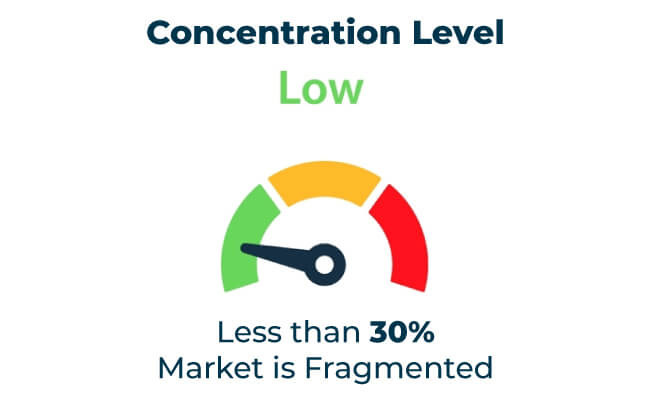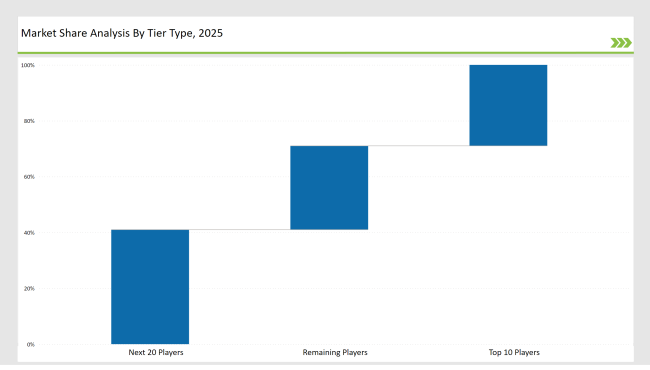The global bio-based sealant films market is highly competitive and highly segmented, with the companies categorized into Tier 1, Tier 2, and Tier 3 based on market presence and strategic positioning. Tier 1 players, such as Amcor, Berry Global, and Sealed Air, together maintain 29% of the market. These companies dominate by making heavy use of the latest biodegradable materials, sustainability commitments, and wide distribution networks to capitalize on rising demand for packaging that is more eco-friendly.
Tier 2 market participants, consisting of Mondi Group, Coveris, and Toray Plastics, currently have around 41% share of the global market. Players like these develop affordable, adaptable sealant films suited for mid-sized businesses or local packaging providers. The same players build additional strength in this market through offerings like compostable films and modern barrier technologies.
Tier 3 players are regional manufacturers and niche startups. They hold 30% of the market, specializing in innovative bio-based formulations, lightweight films, and specialized sealant layers for food and pharmaceutical packaging. Their flexibility allows them to quickly adapt to sustainability regulations and emerging market needs.
Explore FMI!
Book a free demo
Global Market Share by Key Players (2025):
| Category | Market Share (%) |
|---|---|
| Top 3 (Amcor, Berry Global, Sealed Air) | 15% |
| Rest of Top 5 (Mondi Group, Coveris) | 8% |
| Next 5 of Top 10 (Toray Plastics, UFlex, Innovia Films, ProAmpac, Flex Films) | 6% |

The bio-based sealant films market serves industries such as:
Vendors offer specialized products to meet evolving industry needs:
Manufacturers integrate automation, AI-driven production monitoring, and material optimization to enhance efficiency while sustainability remains a major driver for innovation in the bio-based sealant film industry.
This section covers the most prominent players who dominated innovation and growth in the bio-based sealant films market in 2025. Companies released high-barrier biodegradable films that decreased environmental impact. Manufacturers made significant investments in AI-driven quality control to improve efficiency. Firms expanded their production capacity to accommodate the rising demand for sustainable packaging solutions. Businesses developed smart packaging technologies to improve traceability and branding.
Year on Year Leaders:
| Tier Type | Example of Key Players |
|---|---|
| Tier 1 | Amcor, Berry Global, Sealed Air |
| Tier 2 | Mondi Group, Coveris, Toray Plastics |
| Tier 3 | UFlex, Innovia Films, niche startups |

| Manufacturer | Latest Developments |
|---|---|
| Amcor | In January 2024, launched high-recyclability bio-based sealant films. |
| Berry Global | In March 2024, introduced AI-powered quality control for biodegradable films. |
| Sealed Air | In June 2024, expanded production capacity for compostable packaging solutions. |
| Mondi Group | In February 2024, developed high-barrier mono-material films for food packaging. |
| Coveris | In July 2024, launched fully compostable sealant films. |
| Toray Plastics | In April 2024, focused on durable bio-based films for pharmaceuticals. |
| UFlex | In August 2024, expanded sustainable film production in the Asia-Pacific region. |
The industry is transforming with AI-driven production monitoring, sustainable materials and customized barrier solutions. Manufacturers continue to optimize for processes that reduce emissions. Companies invest in single material film solutions for recyclable packaging. Engineers develop high-performance biodegradable sealant films for extended shelf life. Firms enhance digital branding capabilities on eco-friendly packaging. Emerging innovation will drive further investments in next-generation bio-based sealant film technologies.
Amcor, Berry Global, Sealed Air, Mondi Group, and Coveris lead the market.
Tier-1 players collectively hold about 29% of the global market.
AI-based quality control, sustainable materials, and high-barrier solutions drive innovation.
They enhance sustainability, improve shelf life, and meet regulatory compliance.
Smart packaging integrates QR codes and sensors to enhance traceability and consumer engagement.
Nitrogen Flushing Machine Market Analysis by Automatic and Semi-Automatic Through 2035
Pan Liner Market Analysis by Polyethylene (PE), Nylon, Polypropylene, Polyester, Polytetrafluoroethylene (PTFE) and Biodegradable Plastics Through 2035
Perfume Filling Machine Market Analysis by Automatic Perfume Filling Machines and Manual Perfume Filling Machines Through 2035
Molded Pulp Packaging Machines Market Analysis - Growth & Forecast 2025 to 2035
Packaging Tensioner Market Analysis - Growth & Forecast 2025 to 2035
Packaging Films Market Analysis by Product Type, Material Type and End Use Through 2035

Thank you!
You will receive an email from our Business Development Manager. Please be sure to check your SPAM/JUNK folder too.